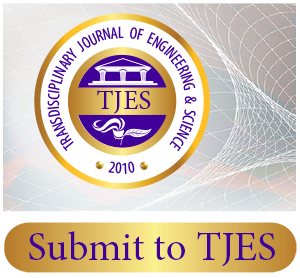| Information |
|---|
| For Readers |
| For Authors |
| For Librarians |
Aims & Scope
The Transdisciplinary Journal of Engineering & Science (TJES) (ISSN 1949-0569) is an annual, peer-reviewed, open-access journal that connects the domains of science, engineering, art, culture, and society to tackle intricate societal issues.
This journal disseminates transdisciplinary (TD) research outcomes that address some of the most pressing global challenges of our time, including climate change, poverty alleviation, cybersecurity, immigration, the effects of technological advancements on future employment and skills, sustainable development, contemporary social research, and education for a convergent future.
The pursuit of specific research and educational accomplishments through transdisciplinary initiatives in the medical sector is strongly encouraged.
Transdisciplinary Research Areas in the Medical Field
The methodology should be designed to confront complicated health issues by recognizing the social, environmental, and behavioral influences that shape health outcomes. By going beyond the boundaries of standard medical research, it aspires to formulate more unified solutions, ultimately aiming for a holistic understanding of the intricate health challenges through the collaboration of different fields of expertise. This journal is particularly interested in the fields of bioengineering and biotechnology research.
Bioengineering and biotechnology are considered a transdisciplinary field of engineering and science. Bioengineering merges principles from the physical, chemical, or mathematical sciences with engineering concepts to study biology, medicine, behavior, or health. It is an increasingly prominent transdisciplinary field of engineering and science that serves as a link between technology, medicine, and biology. To put it differently, the core aim of bioengineering is to apply engineering principles and design concepts within the context of medicine and biology. Biotechnology integrates knowledge and methodologies from various domains such as biology, chemistry, and engineering to address complex issues that require a holistic approach, utilizing insights from multiple fields to develop solutions. Biotechnology research often entails collaboration among diverse scientific and engineering disciplines, rendering it a multidisciplinary and complex field of inquiry. Biotechnology relies heavily on the natural sciences. A significant portion of biotechnology is linked to agricultural engineering and chemical engineering
TJES publishes papers on a broad range of topics in the areas of:
- Addressing transdisciplinary global challenges of our time, such as complex societal issues, climate change, food/water crises, poverty, immigration, the effects of technological advancements on future employment and skills, biodiversity loss, urbanization, and land use.
- Applications of 3D printing in the medical field.
- Manufacturing, customized human tissues and artificial organs intended for transplantation.
- Innovations in biomaterials, tailored healthcare, and additive manufacturing.
- Employing biotechnology to tackle environmental issues, such as bioremediation using microorganisms to remove or reduce pollutants from the environment; purifying waterways to remove contaminants like pathogens, chemicals, and sediments to make water safe and clean; and creating biodegradable materials.
- Creating biodegradable materials, biofuels, and chemicals derived from renewable resources, along with innovating methods for waste management and bioremediation of contaminated areas.
- Applying biotechnology to advance sustainable manufacturing by exchanging fossil fuel-sourced plastics for biodegradable materials, consequently decreasing energy, water, and waste in the bioprocessing sector.
Important
Manuscripts that do not contribute to transdisciplinary research areas will be deemed outside the scope of this journal. The manuscript should include a section that thoroughly describes the transdisciplinary research process used in the paper.


